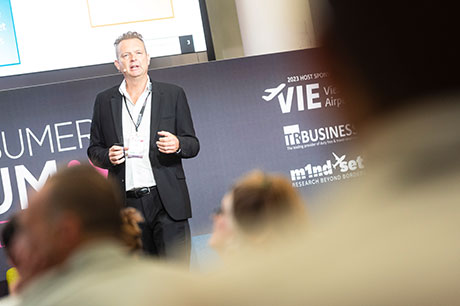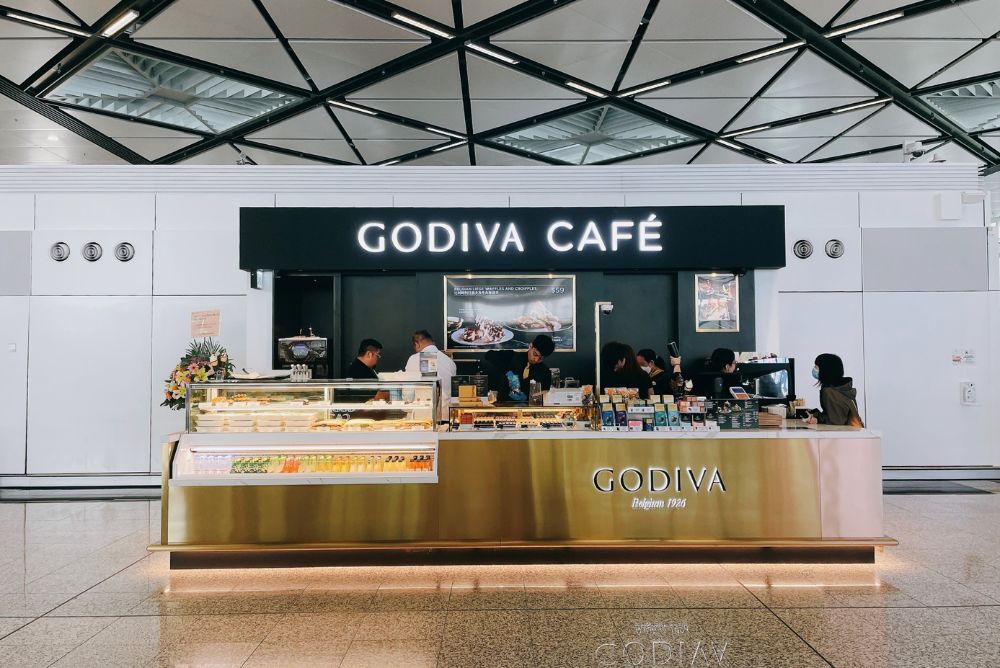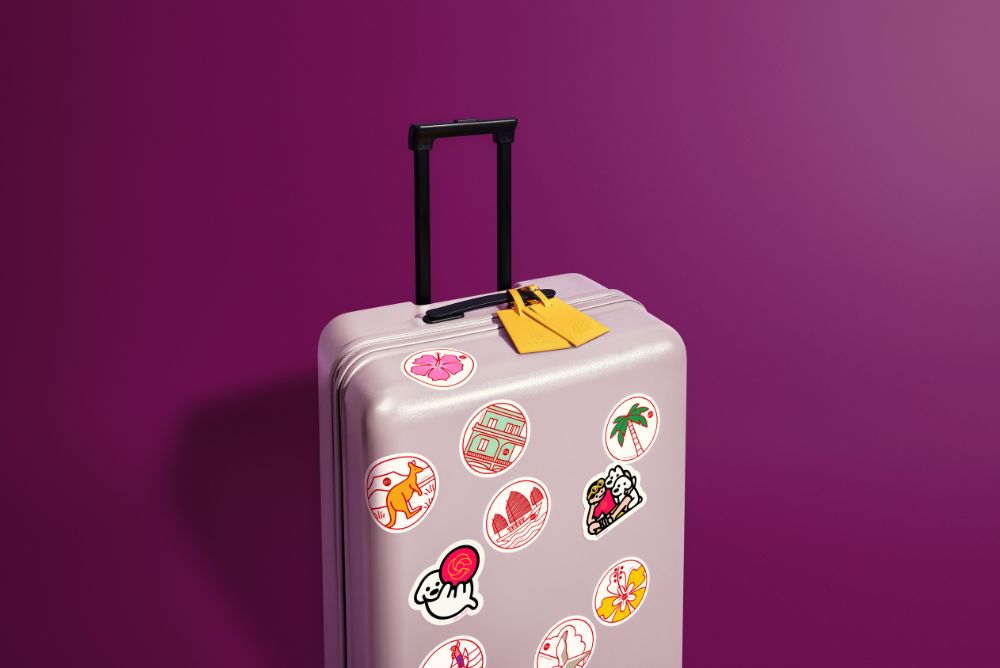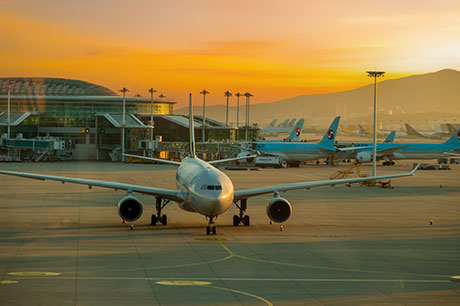Forum: Revenge spend is over and AI/AR/VR is in, say experts
By Kristiane Sherry |

The time for AR/VR and AI is here, the TR Consumer Forum TR in Ten panel says. IMAGE: Grant Pritchard Photography
The age of pent-up travel retail revenge spend is over and stakeholders must embrace the opportunities offered by virtual reality (VR), augmented reality (AR) and artificial intelligence (AI), a panel of experts has said.
Speaking on the future-gazing TR in Ten panel at last week’s TR Consumer Forum, Anna Marchesini, Head of Business Development at research agency m1nd-set, said that consumers are used to AR and how it integrates into daily life.
The panel explored how the industry will change over the next ten years, and what brands and retailers can do to prepare.
Marchesini opened with a detailed look at the Millennial and Gen Z audience and noted that consumers are now skewing much younger.
She also addressed the increased acceptance of AR and VR, especially on social media and across eCommerce.
Shoppers “prefer retailers that implement some kind of virtual reality and augmented reality,” she said. Looking at the bigger picture alongside digitalisation, retailers need to prioritise delighting travellers.
Experiential retail is a “must have to compete especially against other channels including online,” she concluded.
‘Guests’ not ‘passengers’
Next to speak was Philipp Ahrens, Senior Vice President Center Management at Vienna Airport. He reminded delegates that curating a sense of place to promote happiness and relaxation for passengers was essential.
He also continued on the themes raised by Julian Jäger, Vienna Airport CEO, in his keynote, which detailed plans for its new Terminal 3 South Extension project.
“We want to bring our guests – I think that’s a very important word. It will be more “the guests”, not “the passenger” – back into focus,” he stressed.

Vienna Airport has yet to fully embrace digitalisation. IMAGE: Grant Pritchard Photography
However, he was an outlier when he echoed Jäger’s words in saying “we are not a strong believer yet in online shopping”.
He did however acknowledge the need for “Instagrammable moments” on a travel journey that he was working to make more relaxing.
Thomas Kaneko Henningsen, partner at Blueprint, a business development agency, then turned the topic of conversation to Gen Z, the demographic aged today between eight and 23 years.
“Gen Zs are very different,” he opened. “They’re younger, they’re less affluent, they’re greener. They are growing up in the world where politics, where sustainability, digitalisation, artificial intelligence and many other great trends are shaping the world”
He also noted that Gen Zs are “anxious”. “They’re scared about what’s going on,” he continued. “They also want to be part of a world where they feel connected.”
He underscored the importance of the Gen Z consumer: “If we fail to understand that generation, then we will fail to really make sure that our great industry continues to evolve.”
Kaneko Henningsen also gave some examples of where AR and AI are already relevant for travel retail – for example, with a new 24-hour store at Copenhagen Airport.
“Digitalisation is a ladder,” he said, adding that the industry doesn’t need to go from zero to sixty miles an hour in a moment. “We can slowly integrate it.”
He concluded: “The question isn’t whether we embrace this realisation or not. The question is how fast, and to what extent do we do it?”
‘Experience per square metre’
Sören Borch, Director Sales Experience & Excellence at Gebr. Heinemann, then spoke, opening with a new approach. Instead of focusing on spend per square metre in retail, success was being measured on “experience per square metre”.
“We have set a target to begin with, 5% of the spaces that we’re building in the future are actually dedicated for experiences,” he said.
Virtual and augmented reality has a role here in terms of entertaining consumers, he said.
Yet despite the experience-first approach, “What we haven’t seen being successful is virtual reality being used in a way that customers are actually engaging themselves with [in the retail space].
“I think virtual reality in an app or using it regularly is the way to go,” he added, explaining that right now, shoppers needed significant assistance to engage with other types of VR/AR activation.
He rounded off that the most successful brands – especially in airports with high low-cost carrier traffic – were local names with strong sustainability credentials.

AR and AI can help sell beauty products in the channel. IMAGE: Grant Pritchard Photography
Sylvain Delteil, VP Business Development at beauty and lifestyle AR/AI tech firm Perfect Corp made the point that “enjoying is not converting”.
“Personalisation is certainly the secret to conversion,” he said, later adding that it was the difference between a customer trying something out and making a purchase.
He said AR/AI tech could be consistently applied through omni-channel marketing to give customers a consistent brand experience.
Applications across beauty and fashion accessories include picking out the right foundation skin tones and trying on products like earrings and lipstick. Skin consultations also work well.
Revenge spend is over
The final panellist to look into the future of global travel retail was Julie Lassaigne, Secretary General at the European Travel Retail Confederation (ETRC).
She confirmed that the rebounding era of pent-up revenge spend was over, citing m1nd-set data which showed “fantastic figures” as passengers treated themselves when they returned to travel.
“ I think we are starting to see a bit of normalisation in this consumer pattern,” she said, giving high inflation as another reason for spending to be pulled back.
“I think one of the good things actually coming from COVID is the role of partnerships,” Lassaigne continued.

Julie Lassaigne from ETRC says the era of revenge spend is over. IMAGE: Grant Pritchard Photography
“I think we’ve seen retailers and brands much more cooperative, also with landlords, to try to talk to the fewer consumers we have had to make sure the offer was relevant.
“I think it’s going to be important for the years to come.”
She also spoke about how travel retail needs to advocate for itself, including communicating the benefits of shopping in the channel.
One significant advantage is the authenticity of goods, and she highlighted the Duty Free: Trusted, Transparent, Secure campaign developed in partnership with the Duty Free World Council.
The 2023 took place in Vienna, Austria, from 21-23 June. Coverage continues online.
Alcohol insights: Conversion up, spend down in Q4
Conversion of visitors in the alcohol category in duty free has risen to 54% in Q4 2023,...
Men buy and spend more in travel retail says new research by m1nd-set
Men have a higher conversion rate and spend more when shopping in travel retail, says new...
Saudia Arabia's KKIA unfurls T3 duty free expansion
King Khalid International Airport (KKIA) has unveiled the first stage of its much-vaunted duty...
-
 International,
International,Alcohol insights: Conversion up, spend down in Q4
-

-
 International,
International,Saudia Arabia's KKIA unfurls T3 duty free expansion

In the Magazine
TRBusiness Magazine is free to access. Read the latest issue now.

 Trbusiness. The travel retail Trbusiness. The magazine for global retail and duty free professionals.
Trbusiness. The travel retail Trbusiness. The magazine for global retail and duty free professionals.





















